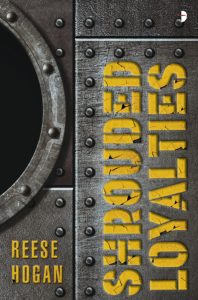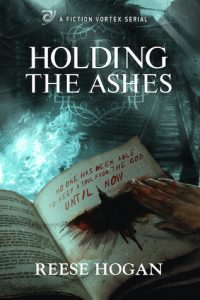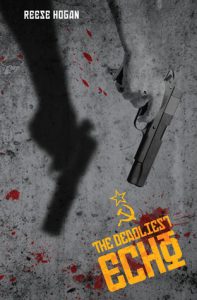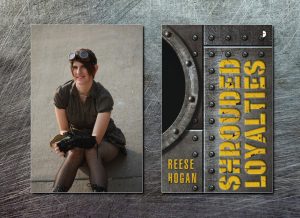Author Spotlight: REESE HOGAN
Joining us for today’s Author Spotlight is Reese Hogan!
Reese Hogan loves nothing more than creating broken relationships in broken worlds. With a Bachelor’s degree in English and a minor in journalism, Hogan has spent the last twenty years honing her craft by taking classes, listening to podcasts, and attending writing workshops and critique groups. She is passionate about music, especially alternative and punk rock, and adamantly believes that art can reach out in a way no other form of communication can. She lives with her family in New Mexico.
Welcome to the Hive, Reese. Let’s start small: tell us about a great book you’ve read recently!
Titanshade by Dan Stout. This was a really fun buddy cop story with a sci fi twist and fantastic characters. I was really impressed by the writing, too. I’m not usually a buddy cop or murder mystery reader, but I was really glad to have picked this one up! It also has one of the greatest covers I’ve seen.
Okay, time to escalate things: reality warps and you suddenly find yourself leading a D&D-style party through a monster-infested dungeon. What character class are you, and what’s your weapon of choice?
I haven’t played Dungeons and Dragons since high school—I was always more a Vampire the Masquerade sort of person—but I recall being partial to playing either a human or elven ranger. I prefer the ranger over the fighter because it’s a more solitary role, with more potential for scouting or hunting. The thought of me leading the party is an amusing thought—I’m more sympathetic to outcast or loner roles—but I’m intrigued at the possibilities of the outcast ranger stuck in the role of leading a party through a dungeon. It sets off all sorts of writerly ideas.
My weapon of choice would be a bo staff. You can blame Darth Maul for that.
 When you’re not trawling through dungeons, how do you like to work? (In silence, with music, or serenaded by the damned souls of a thousand dead shrimps? Do you prefer to type or to hand-write? Are you an architect or a gardener? A plotter or a pantser? D’you write in your underwear, or in a deep-sea diver’s suit?) Tell us a little bit about your writing method!
When you’re not trawling through dungeons, how do you like to work? (In silence, with music, or serenaded by the damned souls of a thousand dead shrimps? Do you prefer to type or to hand-write? Are you an architect or a gardener? A plotter or a pantser? D’you write in your underwear, or in a deep-sea diver’s suit?) Tell us a little bit about your writing method!
I love listening to music when I’m planning or writing something more relaxing (like this interview), but when I’m writing new words, I need absolute silence if possible. I thought I was a plotter, but lately, I’ve been swinging more toward the pantsing side of things. It just depends on the book. I have two hours set aside every day for my writing time, and then, if I’m lucky, I can grab another hour or two after the kids go to bed, depending on their current level of crazy.
What (or who) are your most significant fantasy influences? Are there any creators whom you dream of working with someday?
I have different heroes for different reasons. Maria V. Snyder is a big one, because when I read Poison Study, it was the first time I found the story accessible enough that I thought maybe I could do it, too. I really admire V.E. Schwab because she’s not afraid to try ideas way out there, and also because she’s a testament to continuing on even when you feel like quitting. She’s the one I think of when I’m considering an idea that feels on the too-weird side. I love N.K. Jemison for similar reasons—she likes trying things way outside the conventional. If I could work with anyone, I would pick Myke Cole. First, because I’m obsessed with military fiction and he is really really good at it, and second, because I love the way he backs up the mental health community and speaks up for everything I believe in.
What was the last thing you watched on TV and why did you choose to watch it? Alternatively, what games have you enjoyed recently?
I am currently watching the third season of The Expanse. I absolutely loved the books and I love the show just as much: the characterization, the levels of tension, the unexpected twists in the plot. I can’t get enough of it.
The world shifts, and you find yourself with an extra day on your hands during which you’re not allowed to write. How do you choose to spend the day?
Don’t judge me, but I’d spend it organizing. As my writing has consumed more and more of my life, I feel like the house gets a little more chaotic around me by the day; this sort of thing happens when you have two kids. To me, cleaning is a chore—but organizing isn’t. I love sorting things and getting rid of things and moving stuff around and having a neat and beautiful space when I’m done. It makes me feel in control of my life again. Plus it’s time I can listen to music and let my mind relax and stop obsessing about writing, and that is something I desperately need sometimes.
 Can you tell us a little something about your current work(s) in progress?
Can you tell us a little something about your current work(s) in progress?
I’m working on a sequel for Shrouded Loyalties to pitch to Angry Robot. At the same time, I’m also finishing off a nonfiction piece about the diagnosis of my daughter’s celiac disease, which I hope to share widely at some point in the future. It was a harrowing journey and we learned a lot that I think other people will either connect to or learn from. I think most people know someone with Celiac disease, but I’m not sure most people know how severe—and even life-threatening—it can really be. Our family, unfortunately, does. It’s a story with a happy ending, though, which is everything.
What’s the most (and/or least) helpful piece of writing advice you’ve ever received?
Externalize, externalize, externalize. When your characters are caught in their heads, or you’re describing your world, the pacing slows and it’s easy for readers to zone out. So put some of those essential details in a conversation. Add in the characters’ reactions as they share the information, to disguise the info dump. Italicize characters’ thoughts in a single sentence, rather than telling us their rationale behind an action in a whole paragraph. And remind the reader often how certain actions are helping the MC toward their goal; keeping this forefront in the reader’s mind makes for a stronger story.
Every writer encounters stumbling blocks, be it a difficult chapter, challenging subject matter or just starting a new project. How do you motivate yourself on days when you don’t want to write?
I used to have a good answer to this question of writer’s block—“just go back to the last thing that excited you and try a different direction from there” –but while this sometimes works, experience has grown to show me that it’s not a cure-all. Sometimes, it’s hard to get excited about anything. Sometimes you’ve just had very negative feedback and don’t want to write at all anymore. Sometimes it’s longer than just a day. But in my opinion, writing should never feel like a chore. It should never make you downright miserable. Sometimes, you really do have to give your mind a few days off from writing to clear the cobwebs of despair, and start to tentatively find the threads of gold in there again until you start getting pulled back in. That’s okay. Writing won’t always be magic, but it shouldn’t be a dreaded chore either. You got into this profession for a reason.
For those who want a really good take on stumbling blocks, I strongly recommend the children’s book The Most Magnificent Thing by Ashley Spires. It’s the best book I’ve read to describe the frustrations of the creative process.
 If you could visit any country at any point in history, where/when would you go, and why?
If you could visit any country at any point in history, where/when would you go, and why?
Honestly, I’d like to visit the time of the dinosaurs, when the earth was warmer and the seas were shallower and the world’s crust was violently shifting and changing into what we know today. The world would have felt so alien then, and it would be fascinating to see. I tried to capture some of this kind of feel with the shrouding realm in Shrouded Loyalties, and hope to explore it even more in the sequel.
Tell us about a book that’s excellent, but underappreciated or obscure.
I’m obsessed with Winchester House, so my recommendation is a great sci fi sleeper novel called Vanishing Point by Michaela Roessner. It takes place in the aftermath of 90% of the human race vanishing without a trace. A group of survivors have taken up residence inp the Winchester House. There’s a great sibling dynamic at the forefront, and some very cool twists with parallel and hidden universes, in which the Winchester House plays a central role. It was very unique and very cool.
Finally, would you be so kind as to dazzle us with an elevator pitch? Why should readers check out your work?
The Man In the High Castle meets Stranger Things in this military fantasy about a submariner protecting the secret of a dangerous alternate world, unaware that her partner is a spy and that her brother is collaborating with the enemy.
Brilliant. Thanks again for joining us, Reese!
Reese Hogan is the author of SHROUDED LOYALTIES, available now.

